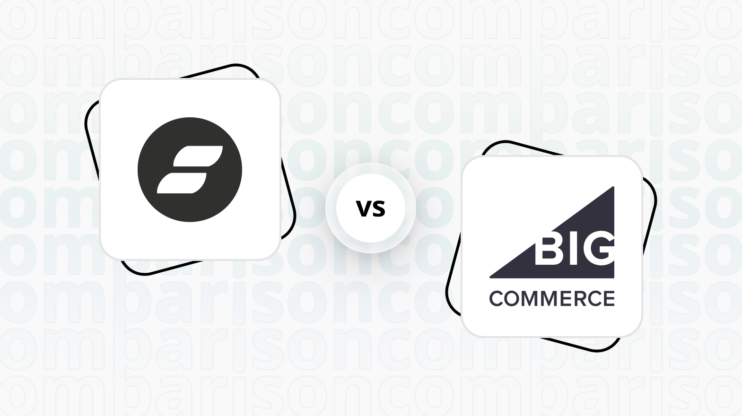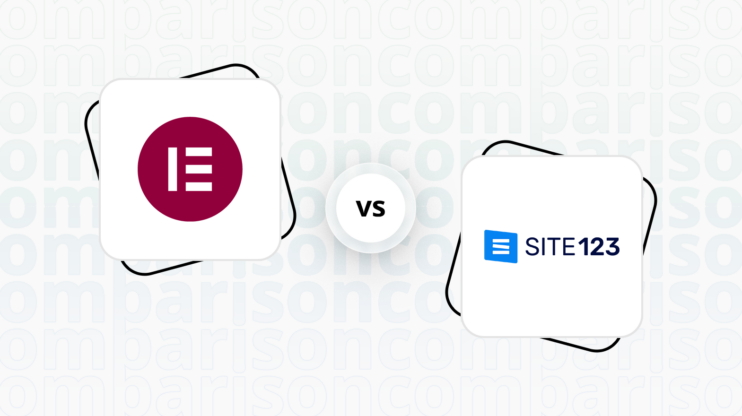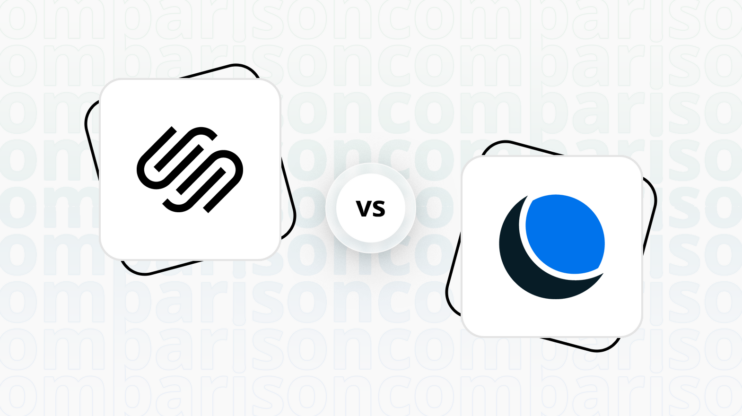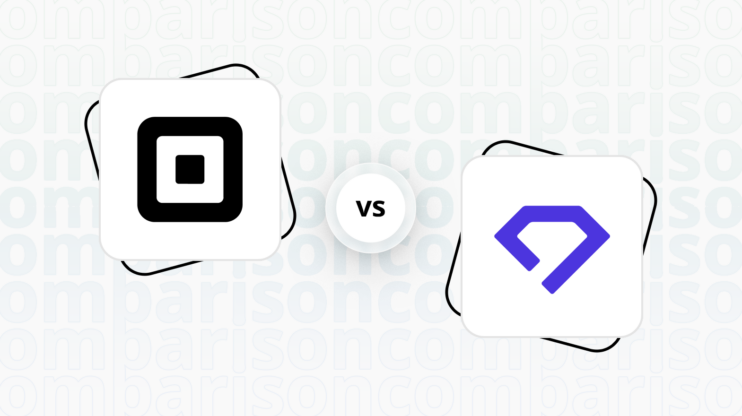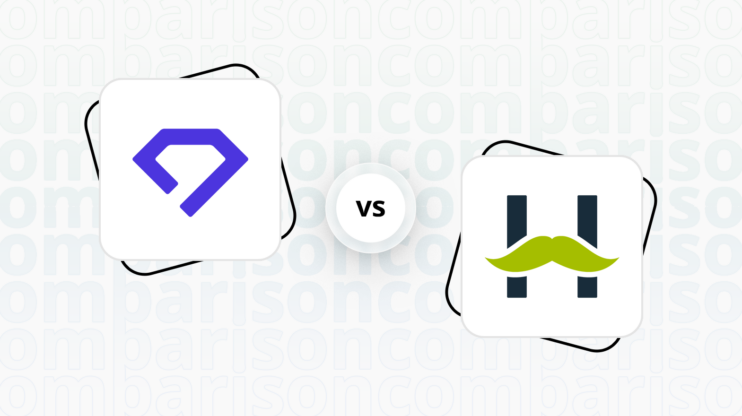Final verdict
Appy Pie and SubHub both offer unique features tailored to different user needs, but Appy Pie emerges as the more versatile and user-friendly option.
-
Appy Pie (Overall Grade: 7.2/10)
is a no-code development platform that excels in ease of use, making it accessible for users without coding skills. It offers a wide range of customizable templates, robust ecommerce features, and comprehensive AI capabilities. Appy Pie is ideal for individuals and businesses looking to quickly establish an online presence with minimal technical effort. Its strong customer support and security measures further enhance its appeal. -
SubHub (Overall Grade: 5.6/10)
is designed specifically for creating and managing membership sites. It provides tools for content creators and entrepreneurs to build a community and monetize their content. While it offers solid learning resources and specific strategies for website speed optimization, it falls short in areas like ecommerce capabilities and AI features. SubHub is best suited for users focused on membership-based business models.

|

|
|
|---|---|---|
|
Design functionalities & templates |
6.8 |
6.8 |
|
Ease of use |
8.3 |
7.7 |
|
Ecommerce |
7.2 |
5.9 |
|
Website Editors |
7.7 |
6.9 |
|
Product testing options |
8.9 |
7.0 |
|
Price |
7.4 |
6.8 |
|
Hosting quality |
6.9 |
5.5 |
|
Website speed optimization |
5.0 |
5.6 |
|
Plugins and integrations |
6.4 |
5.7 |
|
Marketing features |
7.5 |
5.7 |
|
Customer support |
8.2 |
6.3 |
|
Security |
7.5 |
4.0 |
|
AI capabilities |
7.2 |
0 |
|
User Management |
7.3 |
5.2 |
Best for ecommerce
 7.2
7.2
 5.9
5.9
Verdict
: Appy Pie is better suited for general ecommerce needs with a broader range of features, while SubHub is more specialized for membership and content monetization.
-
Appy Pie
: Appy Pie’s Website Builder is designed for ease of use, offering a range of ecommerce features such as product and inventory management, multiple payment gateways, and analytics. It is ideal for users looking to quickly set up an online store without needing advanced technical skills. With a score of 7.2, it provides a comprehensive solution for ecommerce, making it a practical choice for small to medium-sized businesses. -
SubHub
: SubHub focuses on membership sites and content monetization, offering tools for subscription models and member management. While it supports ecommerce through PayPal and Stripe integrations, its features are more tailored to content creators and entrepreneurs looking to build a community. With a score of 5.9, it may not be the best choice for traditional ecommerce but excels in its niche of membership-based businesses.
Best for informational & business websites
 7.4
7.4
 7.2
7.2
Verdict
: When comparing Appy Pie vs SubHub for informational and business websites, Appy Pie slightly edges out SubHub due to its user-friendly interface and broader range of functionalities, making it more versatile for various business needs.
-
Appy Pie
: Appy Pie scores 7.4 and is known for its simplicity and ease of use, making it accessible for users without coding skills. Its drag-and-drop interface and customizable templates are ideal for quickly creating professional-looking websites. The platform’s focus on ease-of-use and quick deployment makes it a practical solution for creating informational and business websites efficiently. -
SubHub
: SubHub scores 7.2 and is tailored for creating and managing membership sites. It offers tools for content creators and entrepreneurs to build a community and monetize their content. While it excels in this niche, it may not be as versatile as Appy Pie for general informational and business websites. However, its ease of use and specific features for membership sites make it a strong contender in its domain.
Detailed comparison
Design functionalities & templates
Design FunctionalitiesRepresents how well each platform allows for creative design and customization of websites.Score Components:
- Template Variety (30%): Range and quality of design templates.
- Customization (30%): Flexibility and options for design alterations.
- User Interface (20%): Ease and intuitiveness of the design process.
- Responsiveness (10%): Adaptability to different devices and screen sizes.
- Innovation (10%): Unique design features and tools.
 6.8
6.8
 6.8
6.8
Winner: Tie.
Both Appy Pie and SubHub offer similar capabilities in terms of design functionalities and templates.
Appy Pie offers a wide array of website templates with over 10,000 options, catering to various needs and budgets. These templates are mobile-friendly and customizable, allowing users to edit colors, fonts, layouts, and add features. The platform’s pre-designed themes, layouts, and user-friendly drag-and-drop builder enhance visual appeal and customization ease, making it accessible for users without coding knowledge.
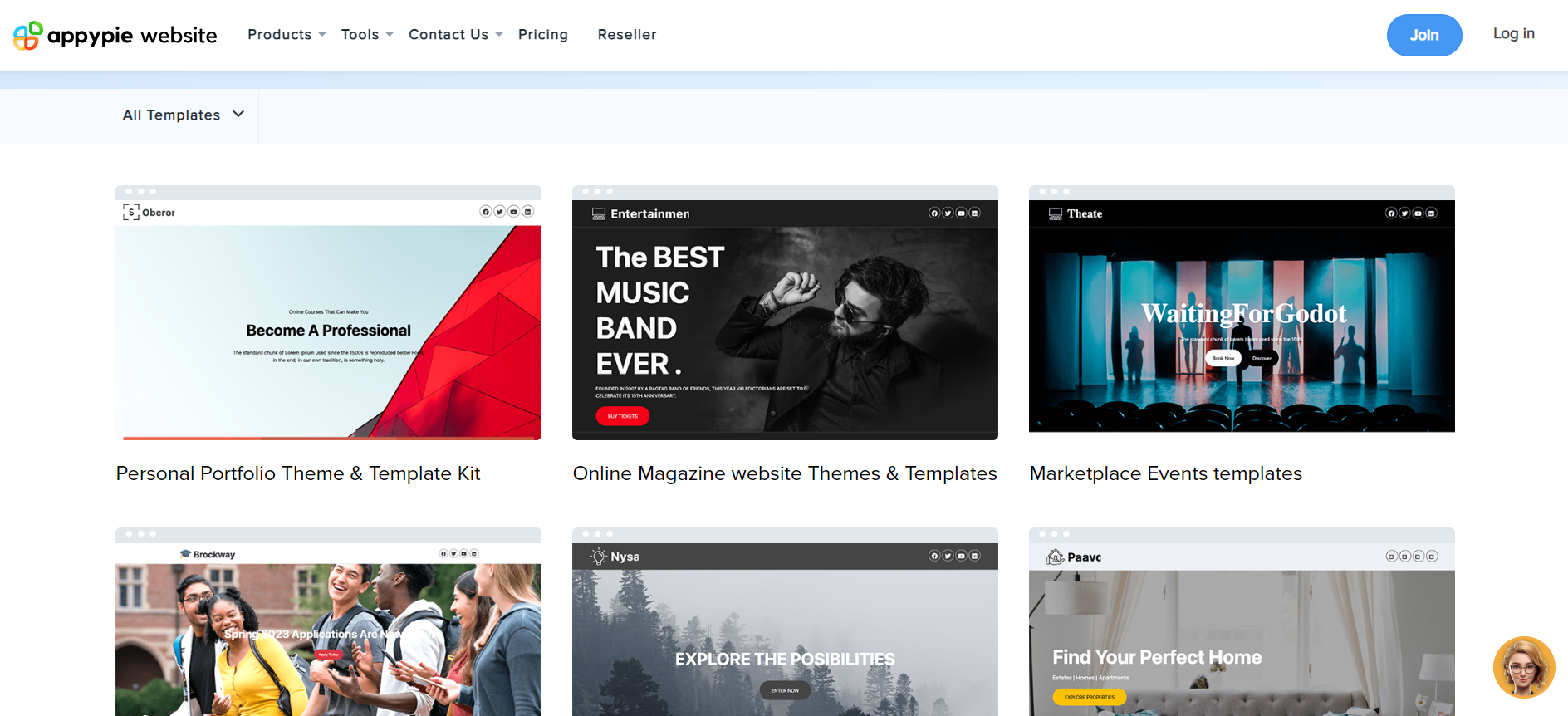

On the other hand, SubHub website builder offers a variety of customizable membership website templates designed to cater to different needs and themes. There are 14 specifically themed templates available, each designed to help users jump-start the design of their membership website homepages. These templates are fully customizable, allowing users to modify layouts, add or remove sections, and tailor content to fit their brand, ensuring flexibility in the design process.
Get a head start on website creation with AI
Create a custom website tailored to your business needs 10X faster with 10Web AI Website Builder!
Ease of use
Ease of useReflects the platform’s overall user-friendliness.Score
Components:
- Learning curve (40%): Quickness and ease of getting started.
- Interface design (30%): Simplicity and intuitiveness of layout.
- User guidance (20%): Quality of tutorials and support.
- Flexibility (10%): Adaptability to various user skills.
 8.3
8.3
 7.7
7.7
🏆 Winner: Appy Pie
. Scoring 8.3, Appy Pie is known for its simplicity and intuitive design, making it highly accessible for users without coding skills. SubHub, with a score of 7.7, offers a user-friendly platform designed for building membership websites and online courses, but it may lack some advanced features found on other platforms.
Learning Resources
🏆 Winner: SubHub
. While both platforms offer solid learning resources, SubHub goes a step further with its comprehensive video guides and tutorials, detailed FAQ section, and premium phone support, making it easier for users to learn and adapt.
For ecommerce
EcommerceMeasures the platform’s effectiveness in supporting online business activities.Score Components:
- Ecommerce themes and templates (20%): Variety and design of templates.
- Product management (25%): Ease of managing and organizing products.
- Payment options (25%): Variety and convenience of payment methods.
- Ecommerce features (20%): Features for managing an ecommerce store.
- Integration (10%): Compatibility with external e-commerce tools and services.
 7.2
7.2
 5.9
5.9
Appy Pie and SubHub both offer ecommerce capabilities, but they cater to different needs and audiences. Appy Pie is a more comprehensive solution, offering a wide range of ecommerce features such as product and inventory management, a secure shopping cart, diverse payment gateways, support for multiple currencies, promotions, order management, shipping options, tax calculation, and analytics. On the other hand, SubHub is more focused on content creators and entrepreneurs who aim to build a community and monetize their content. It offers tools for setting up subscription models, managing member access, and providing exclusive content.

|

|
|
|---|---|---|
|
Ecommerce themes and templates |
6.0 |
3.0 |
|
Product page customization |
7.0 |
6.5 |
|
Payment processing and commissions |
6.5 |
7.0 |
|
POS capabilities |
6.0 |
0.0 |
|
Payment gateways |
7.5 |
6.0 |
|
Product numbers |
6.5 |
5.0 |
|
Additional ecommerce features |
7.0 |
4.5 |
Appy Pie ecommerce features:
- Product and Inventory Management
- Shopping Cart
- Multiple Currencies
- Promotions and Discounts
- Order Management
- Shipping Options
- Analytics
- Tax management
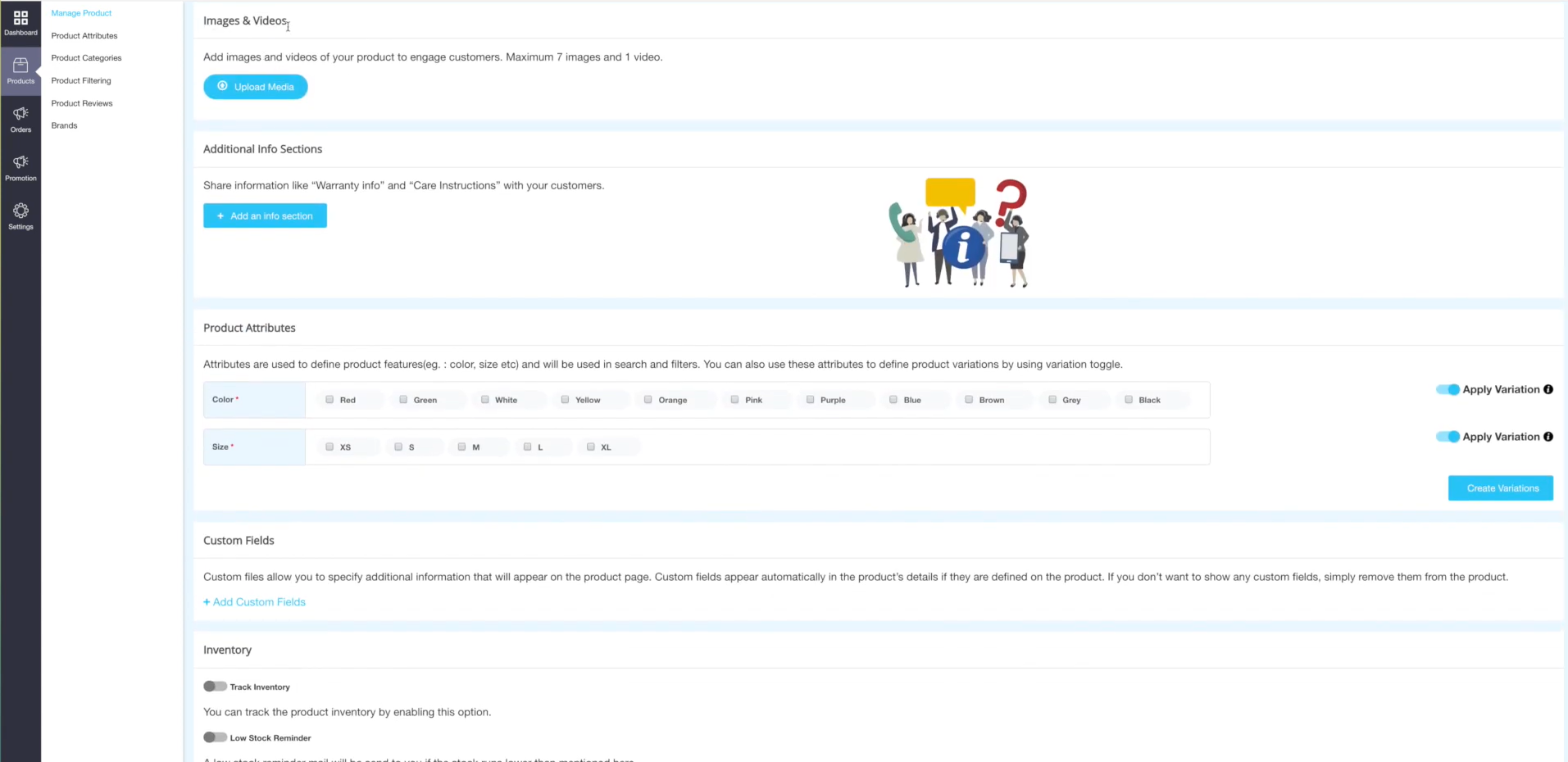
SubHub ecommerce features:
- Paypal and Stripe integration
- Physical and Digital product listings
- Pay-per view products
Ecommerce themes & templates
Appy Pie offers a small selection of ecommerce website templates. These templates are designed to help users create online stores quickly and efficiently, without the need for coding skills. Appy Pie’s ecommerce templates feature mobile-first designs, customizable product galleries, and various other features aimed at enhancing the online shopping experience for both the store owner and their customers. On the other hand, SubHub does not offer ecommerce specific templates.
Product page customization
Appy Pie’s Website Builder provides users with extensive customization options for product pages, enabling the creation of unique online stores or product showcases without requiring advanced coding skills. Users can personalize product details like descriptions, images, and pricing, ensuring they can offer comprehensive information to assist customers in making informed purchasing choices. SubHub also offers a range of product page customization options, allowing for the addition of physical items, digital downloads, and pay-per-view content. Features include the ability to manage product variants, upload images, and set visibility preferences. Users can also implement SEO strategies through meta tags and manage tax settings. Additional functionalities include member-specific discounts, image carousels, and individualized shipping costs.
Payment processing
Appy Pie offers a user-friendly platform for integrating payment processing and POS capabilities into mobile apps and online stores, supporting multiple payment gateways like PayPal, Stripe, and Square for secure and versatile customer transactions. While it facilitates easy payment integrations, commission management may require third-party solutions or custom setups. This makes Appy Pie an effective tool for businesses looking to provide a comprehensive shopping experience with a focus on mobility and flexibility. SubHub supports two main payment gateways: Stripe and PayPal. These integrations allow for secure payment processing for subscriptions and store items using debit or credit cards. The platform itself does not charge commissions on transactions.
Website Editors
Website EditorsEvaluates the platforms’ website building and editing capabilities.Score Components:
- Customization tools (40%): Range and power of editing features.
- Editor usability (30%): User experience within the editor.
- Design flexibility (20%): Freedom in layout and design changes.
- Update and maintenance ease (10%): Simplicity of updating and maintaining the site.
 7.7
7.7
 6.9
6.9
🏆
Winner: Appy Pie
. Appy Pie, with a score of 7.7, offers a user-friendly, cloud-based platform that allows individuals, professionals, and small businesses to create mobile-friendly websites without needing to code. It offers a drag-and-drop interface, customizable templates, and various features like social media integration, ecommerce capabilities, and SEO tools. This makes it an ideal solution for quickly creating a wide range of websites, from landing pages to online stores, tailored to users’ specific needs and brand identities.
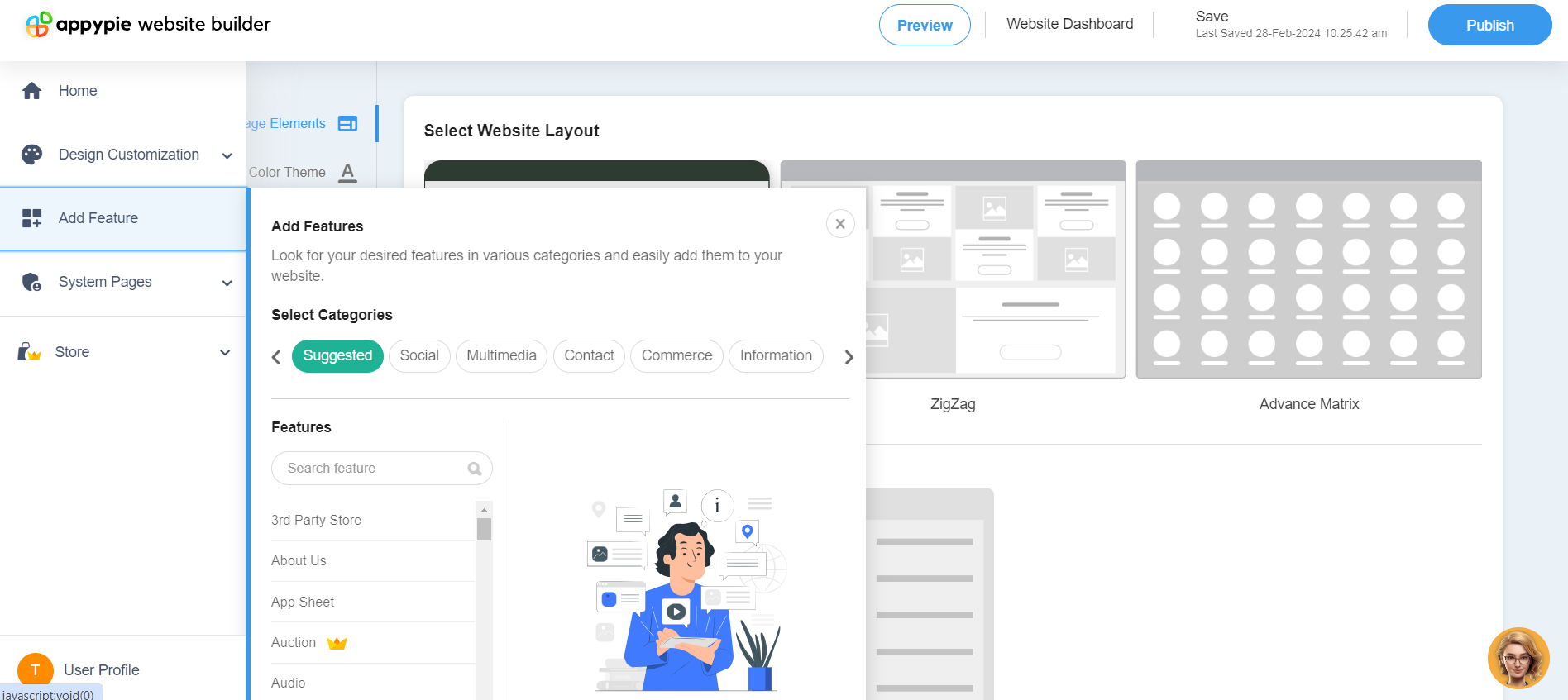
SubHub’s editor, scoring 6.9, is tailored for creating and managing membership sites, catering to content creators and entrepreneurs aiming to monetize their offerings. Its features encompass customizable templates, diverse content publishing options, and flexible subscription plans with seamless integration for recurring revenue through payment processors. Additionally, SubHub supports online course creation, provides marketing tools like landing page builders, and offers detailed analytics for monitoring website metrics.
Mobile editor/app
 5.5
5.5
 4.0
4.0
🏆
Winner: Appy Pie
. Both Appy Pie and SubHub do not have a dedicated mobile app for editing websites. However, Appy Pie allows users to edit their websites using a mobile browser, providing a certain level of convenience for on-the-go adjustments.
On the other hand, SubHub also allows users to manage some content on their website using the mobile browser version, but it does not support changes to the layout and design of the website on mobile.
In summary, while both platforms lack a dedicated mobile app for website editing, Appy Pie offers a slightly better mobile editing experience, hence it scores higher in this category.
Product testing options
Product Testing OptionsAssesses the options for trying out platform features before commitment.Score Components:
- Trial quality (40%): Extent and usefulness of the trial or free version.
- Feature accessibility (30%): How many features are available to test.
- Trial duration (20%): Length of the trial period.
- Ease of transition (10%): Smoothness of moving from trial to paid plans.
 8.9
8.9
 7.0
7.0
Overall Result
:
Appy Pie Wins
. Appy Pie scores 8.9 in product testing options, outperforming SubHub’s score of 7.0. Appy Pie offers a longer trial period of 30 days, during which all premium features can be tested. However, it does not offer a money-back guarantee. SubHub, on the other hand, provides a 14-day free trial and a 7-day money-back guarantee.

|

|
|
|---|---|---|
|
Free Plan |
No | No |
|
Trial Duration |
30 days | 14 days |
|
Testing Premium Features |
All features during free trial |
During the free trial |
|
Money Back Guarantee |
No | 7-day money back guarantee |
Price
PriceLooks at the cost-effectiveness and value for money of each platform.Score Components:
- Plan value (40%): What each pricing tier offers.
- Transparency and clarity (30%): Clearness of pricing structures.
- Flexibility of plans (20%): Range of options to suit different budgets.
- Hidden costs (10%): Additional expenses not included in the plan.
 7.4
7.4
 6.8
6.8
Appy Pie and SubHub both offer competitive pricing plans, but Appy Pie scores slightly higher in terms of price.
Appy Pie’s plans start at $18 per month and offer features like 50 GB storage, professional theme templates, domain connection, and no Appy Pie ads. On the other hand, SubHub’s plans start at $47 per month and offer features like up to 500 members, 5 GB storage, secure payment processing, and a course builder. Both builders offer discounts for annual subscriptions, with Appy Pie offering around a 16% discount and SubHub offering a 15% discount.
In terms of enterprise plans, Appy Pie offers a custom solution for enterprise-level demands, while SubHub does not have an enterprise plan.

|

|
|
|---|---|---|
|
$10-$20 |
Start ($18/month): Suitable for personal projects, offering 50 GB storage and access to professional theme templates, domain connection, no Appy Pie ads, CSS & Java customization, etc. Value for price: 6.5 |
No offering at this amount. |
|
$30-$50 |
Grow ($36/month): Aimed at small businesses, providing unlimited storage, advanced marketing and monetizing tools, multiple payment gateways, etc. Value for price: 8.5 |
Starter ($47/month): Up to 500 members, 5 GB storage, secure payment processing, course builder, 5 landing pages, e-commerce. Value for price: 6.5 |
|
$90-$100 |
No offering at this amount. |
Pro ($97/month): Up to 2000 members, 50 GB storage, removes SubHub branding, 15 landing pages, along with Starter features. Value for price: 7.5 |
|
$100+ |
No offering at this amount. |
Premium ($147/month): Unlimited members, 200 GB storage, email white labelling, 30 landing pages, plus all Pro features. Value for Price: 8.5 |
location. As a result in rare cases the prices displayed here can differ from the ones you see on their
websites.
Hosting quality
Hosting
qualityExamines the reliability and performance of the hosting solutions.Score Components:
- Uptime (40%): Consistency and reliability of website availability.
- Speed (30%): Loading times and performance.
- Bandwidth and storage (20%): Sufficiency of resources provided.
- Data centers (10%): Quality and distribution of hosting infrastructure.
 6.9
6.9
 5.5
5.5
🏆
Winner: Appy Pie
Appy Pie offers a proprietary hosting service with a 99% uptime guarantee and relies on Amazon Web Services (AWS) for its data centers. SubHub, on the other hand, provides managed cloud hosting but does not disclose its uptime statistics or the locations of its data centers. Appy Pie’s transparency and reliability give it the edge in this category.

|

|
|
|---|---|---|
|
Do they offer hosting? |
Yes |
Yes |
|
Data Centers: |
AWS |
Not disclosed |
|
Type of hosting: |
Proprietary hosting |
Managed Cloud Hosting |
|
Uptime: |
99% |
Not disclosed |
|
Uptime Guarantee: |
Yes, 99% |
No |
Website Speed Optimization
Website Speed OptimizationEvaluates optimization of website loading timesScore Components:
- PageSpeed Score (30%): Google’s score indicating performance optimization.
- Loading Time (30%): The average time until a website is fully interactive.
- Mobile Optimization (15%): Optimization effectiveness for mobile devices.
- Resource Optimization (15%): Optimizing images, scripts, and other heavy resources.
- CDN Usage (10%): Use of CDN to enhance speed across geolocations.
 5.0
5.0
 5.6
5.6
🏆 Winner: SubHub
Both Appy Pie and SubHub have similar website speed optimization scores, but SubHub has a slight edge due to its specific strategies for speed optimization.

|

|
|
|---|---|---|
|
Focus |
User-driven optimization |
Image Optimization, Caching, Mobile Optimized design |
|
Performance Tools |
User-driven tools and features |
Built-in optimization tools |
|
Key Strategies |
User-driven optimization |
Image Optimization, Caching, Mobile Optimized design |
|
Load Times |
Varies widely, depending on optimization and user’s location |
Varies depending on optimization and website complexity |
|
Page Speed Scores Range |
Varies widely, depending on optimization and user’s location |
Varies depending on optimization and website complexity |
|
Core Web Vitals Improvement |
No specific information disclosed |
No specific information disclosed |
Appy Pie, as a website building platform, doesn’t directly implement specific speed optimization strategies for your website. However, they offer various tools and features that can help you optimize your website’s speed on your own. Both load times and Page speed scores vary widely, depending on the optimization and user’s location. Appy Pie does not disclose any information on their Core Web Vitals improvements.
SubHub, on the other hand, implements specific strategies such as image optimization, caching, and mobile-optimized design. The load times and PageSpeed scores vary depending on optimization and website complexity. Like Appy Pie, SubHub does not provide any information on their Core Web Vitals improvements.
Get a head start on website creation with AI
Create a custom website tailored to your business needs 10X faster with 10Web AI Website Builder!
Plugins and integrations
Plugins and integrationsMeasures the range and effectiveness of additional plugins and integrations.Score Components:
- Variety of options (40%): Range of available add-ons.
- Integration smoothness (30%): Ease of integrating plugins into the site.
- Quality of plugins (20%): Functionality and reliability of the options.
- Custom integration capabilities (10%): Support for custom or third-party integrations.
 6.4
6.4
 5.7
5.7
🏆 Winner: Appy Pie.
With a score of 6.4, Appy Pie offers a wider range of plugins and extensions compared to SubHub, which scores 5.7. Appy Pie’s plugins enable functionalities such as ecommerce capabilities, social media integration, SEO tools, analytics, live chat, security enhancements, and more. On the other hand, SubHub’s plugins expand the capabilities of the website builder beyond its core features, allowing for enhanced user experiences, broader payment options, and improved content management. However, Appy Pie’s broader functionality range without needing coding skills gives it the upper hand.
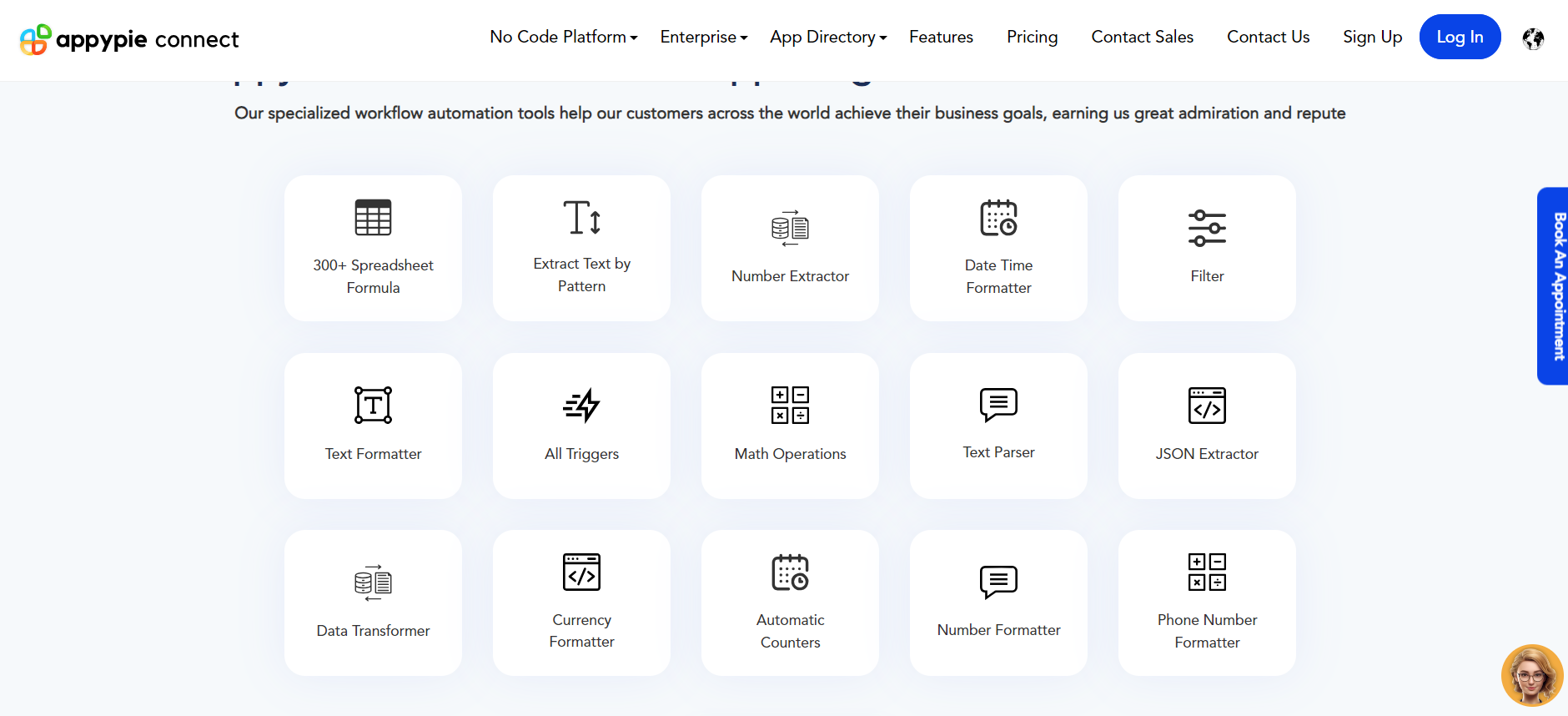
Marketing Features
Design FunctionalitiesRepresents how well each platform allows for creative design and customization of websites.Score Components:
- Template Variety (30%): Range and quality of design templates.
- Customization (30%): Flexibility and options for design alterations.
- User Interface (20%): Ease and intuitiveness of the design process.
- Responsiveness (10%): Adaptability to different devices and screen sizes.
- Innovation (10%): Unique design features and tools.
 7.5
7.5
 5.7
5.7
🏆
Overall Winner: Appy Pie
. Appy Pie has a higher score in marketing features, indicating a more comprehensive set of tools for SEO, email marketing, blogging, social media integration, analytics and reporting, and ads and promotions. SubHub, while offering similar features, lacks in social media integration and has a lower overall score.

|

|
|
|---|---|---|
|
SEO Tools |
|
|
|
Email Marketing |
|
|
|
Blogging |
Platform supports content creation and management, which can be leveraged for blogging purposes. |
Yes |
|
Social Media Integration |
Simplifies content sharing and audience engagement on major social platforms |
No |
|
Analytics and Reporting |
Integration with Google Workspace may offer insights into web traffic and user behavior. |
Yes |
|
Ads and Promotions |
Tools for creating and managing promotional content |
Yes |
Customer Support
Customer supportEvaluates the quality and availability of support options.Score Components:
- Response time (40%): Speed of support responses.
- Support quality (30%): Effectiveness and helpfulness of the support.
- Availability (20%): Range of support channels (phone, chat, email).
- Resource richness (10%): Quality of self-help and educational materials.
 8.2
8.2
 6.3
6.3
🏆 Winner: Appy Pie
. In the comparison of Appy Pie vs SubHub, Appy Pie takes the lead with a higher customer support score of 8.2 compared to SubHub’s 6.3. Appy Pie offers 24/7 support through live chat, email, and phone, ensuring users can get assistance whenever they need it. Additionally, Appy Pie provides extensive documentation and tutorials, making it easier for users to troubleshoot issues independently.
SubHub, on the other hand, offers customer support primarily through email and a support portal, with an FAQ section for common questions. While SubHub’s support is accessible and responsive, it lacks the round-the-clock availability and multiple support channels that Appy Pie provides. This makes Appy Pie a more robust option for users seeking comprehensive and readily available customer support.
Security
SecurityLooks at the platforms’ security measures and data protection.Score Components:
- Data protection (40%): Safeguards for user and customer data.
- SSL and encryption (30%): Implementation of secure connections.
- Compliance (20%): Adherence to industry security standards.
- Regular updates (10%): Frequency of security updates and patches.
 7.5
7.5
 4.0
4.0
🏆
Winner: Appy Pie
. Appy Pie’s commitment to security is evident in its robust measures, including SSL encryption, regular security audits, secure hosting, two-factor authentication, and password protection for user accounts. They also have a dedicated team that monitors and responds to any security threats or breaches, ensuring the safety of user data and websites.
SubHub, on the other hand, does not provide any information about its website security measures. While it emphasizes compliance with GDPR and CCPA regulations in its privacy policy, the lack of transparency about its website security measures is a concern. Therefore, Appy Pie is the clear winner in this comparison.
AI Capabilities
AI capabilitiesMeasures the effectiveness of AI-driven features and tools.Score Components:
- Automation efficiency (40%): Impact of AI on streamlining processes.
- Personalization (30%): AI-driven customization for users or customers.
- AI-Assisted design (20%): Role of AI in website design and functionality.
- Data analysis (10%): Use of AI in interpreting user data and analytics.
 7.2
7.2
 0
0

|

|
|
|---|---|---|
|
AI Builder |
Appy Pie’s AI builder designs and customizes websites based on user preferences and industry-specific templates |
|
|
AI Ecommerce features |
Personalized shopping experiences and chatbots for 24/7 customer service |
|
|
AI Content Generation |
Content generation tailored to match user goals and audience |
|
|
Additional AI Features |
Chatbots, virtual assistants, and AI-powered analytics |
|
🏆 Winner: Appy Pie
. Appy Pie, with a score of 7.2, offers a comprehensive range of AI features including an AI builder, AI ecommerce features, AI content generation, and additional AI features such as chatbots, virtual assistants, and AI-powered analytics. These features make website creation quick and easy for businesses and individuals, and help businesses automate customer interactions, make data-driven decisions, and create personalized user experiences.
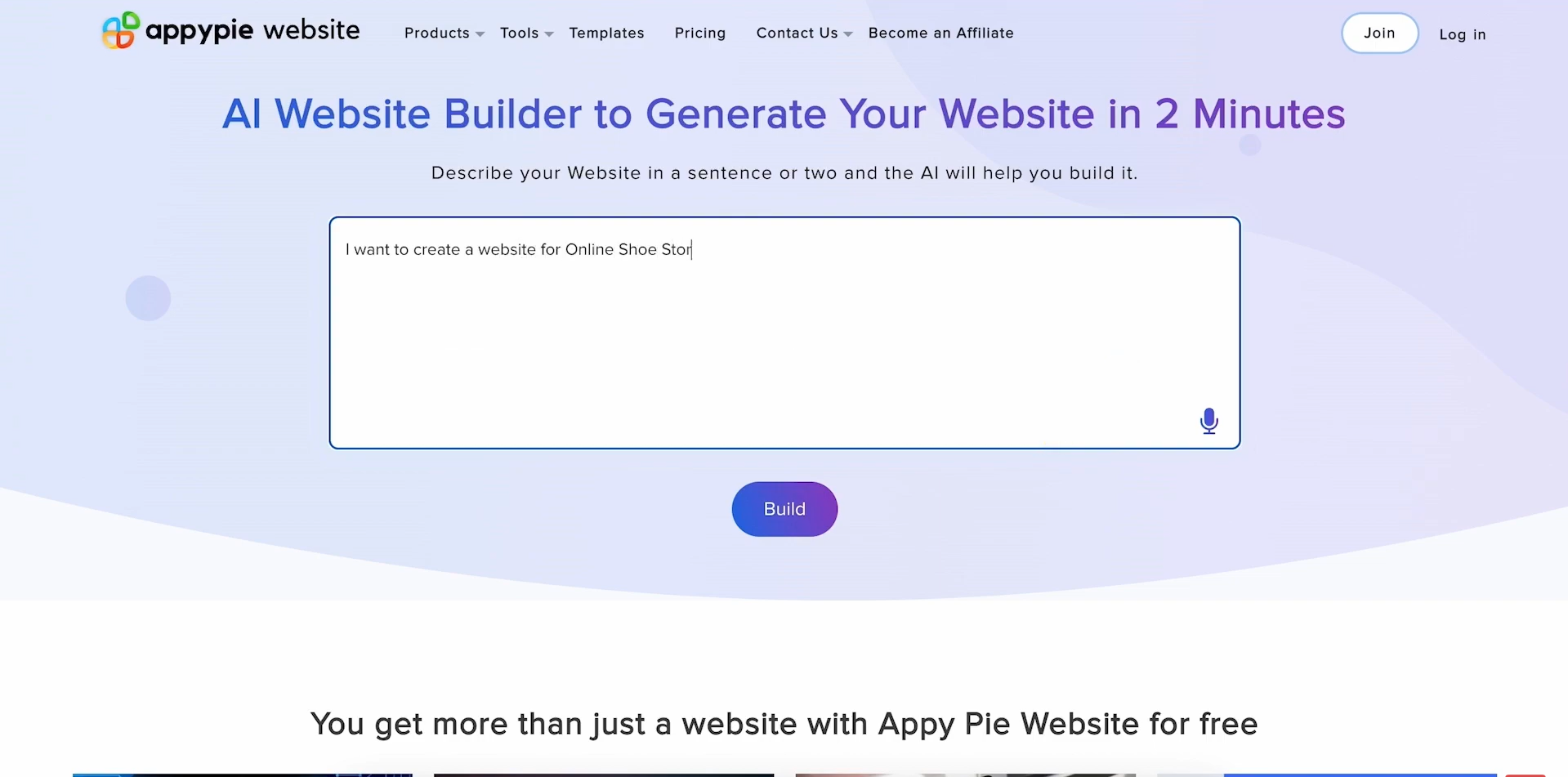
SubHub, on the other hand, does not have any AI capabilities and therefore has a score of 0. It does not offer any AI builder, AI ecommerce features, AI content generation, or additional AI features.
User Management
User ManagementAssesses the platforms’ capabilities in managing user roles, permissions, and accessibility.Score Components:
- Role Customization (40%): Flexibility in creating and defining user roles and
permissions. - Ease of Management (30%): User interface and tools for managing users.
- Access Control (20%): Effectiveness of access control measures for different user
levels. - Scalability (10%): Ability to manage a growing number of users efficiently.
 7.3
7.3
 5.2
5.2
🏆 Winner: Appy Pie
. Both Appy Pie and SubHub offer different user access levels, but Appy Pie provides a more detailed and flexible approach.
- Appy Pie offers different user access levels based on the plan chosen. For the Free Plan, one user has full editing privileges. Paid plans include the Starter Plan (3 users), Hobby Plan (5 users), Professional Plan (10 users), and Enterprise Plan (unlimited users). Each plan designates an Admin with full access and additional Editors with varying editing rights. Additionally, paid plans allow for customization of roles, enabling tasks such as content editing or design adjustments.
- SubHub allows multiple user accounts, however the platform does not specify how many accounts are supported.
SubHub User Roles and Access Levels:
| Role | Description | Access Highlights |
|---|---|---|
| Administrator | Full access to the platform except for Homepage and Course Editor. | Can manage all aspects of the platform, including content, store, and member management. |
| Content Management | Focuses on managing and organizing content within the platform. | Can access and manage content-related features but does not have access to Homepage or Course Editor. |
| Store (access only) | Specializes in handling the platform’s store features. | Limited to store management functions; no access to Homepage, Course Editor, or member management. |
| Member Manager (access only) | Oversees member accounts, roles, and subscriptions. | Can manage members and their subscriptions but cannot access Homepage, Course Editor, or store management. |
| Origin Admin Email | The initial administrator with the highest level of access, including Homepage and Course Editor. | Exclusive access to Homepage and Course Editor, on top of what the Administrator role provides. |
Additional Features

|

|
|
|---|---|---|
|
SSL Certificate |
|
|
|
Custom Domain |
|
|
|
Free Custom Domain Included |
|
|
|
International Domains |
|
|
|
Mobile Responsive |
|
|
|
Page Speed |
|
|
|
Website Builder Mobile App |
|
|
|
Convert a Website To An App |
|
|
|
Website Analytics |
|
|
|
Multilingual Sites |
|
|
|
Multiple Users |
|
|
User Feedback
Appy Pie garners positive feedback for its user-friendly interface and excellent customer support, offering low-code solutions for app and website building without requiring coding experience. Users appreciate its ease of use, extensive features, and ability to create apps and websites quickly. While some express a desire for more customization options and templates, overall, Appy Pie serves as a valuable tool for businesses and individuals seeking to create apps and websites efficiently.
User feedback on SubHub presents a mix of positive and negative experiences, emphasizing the platform’s feature-rich environment and customizable templates. Users appreciate the flexibility and the quality of customer service, highlighting the platform’s continual updates and support as key benefits. However, some users express dissatisfaction with aspects such as the platform’s interface, lack of community features, and service fees for ticket resale. Concerns were also raised about the custom design service and mobile-friendly solutions taking longer than expected.
The making of this blog
We followed a clear, step-by-step process to write and research this article.
FAQ
Which platform is better for creating a membership site, Appy Pie or SubHub?
Can I use Appy Pie for ecommerce?
Is SubHub good for beginners?
Which platform offers better customer support, Appy Pie or SubHub?
How do Appy Pie and SubHub compare in terms of AI capabilities?
Which platform is more affordable, Appy Pie or SubHub?
Can I test both platforms before committing to a plan?
Which platform is better for hosting quality and reliability?
Do Appy Pie and SubHub support mobile-responsive designs?
Which platform offers more design and customization options?










